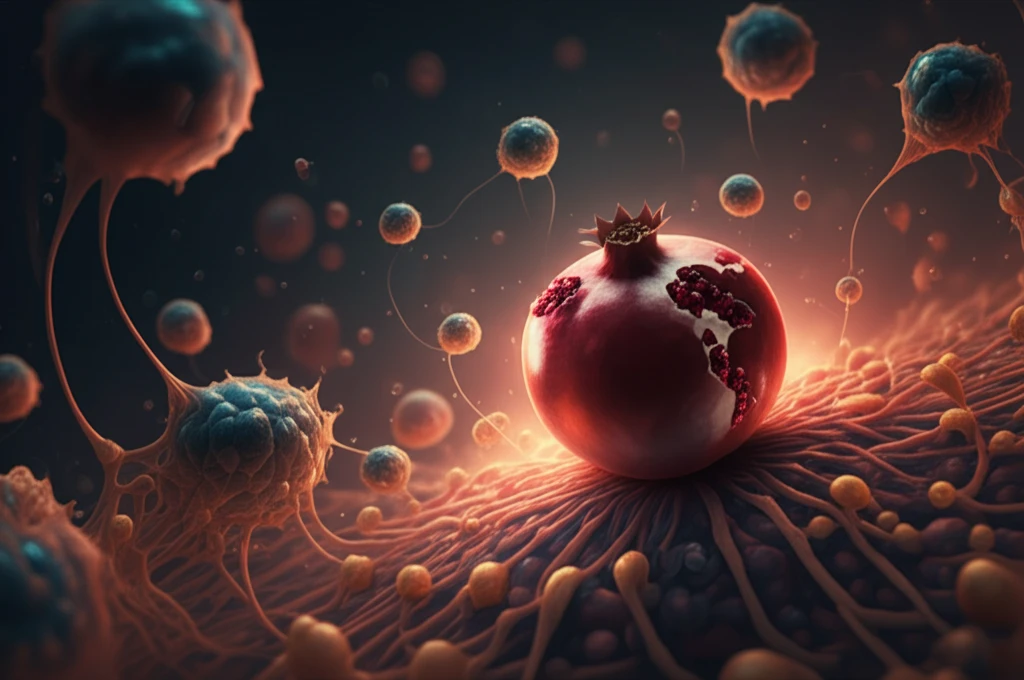
Urolithin A: The Natural Compound Revolutionizing Pancreatic Cancer Research?
"Discover how this pomegranate-derived compound targets a critical pathway in pancreatic cancer, offering new hope for treatment."
Pancreatic cancer, particularly pancreatic ductal adenocarcinoma (PDAC), remains one of the most challenging and deadly cancers to treat. With a five-year survival rate stubbornly below 9%, the disease often presents with advanced metastasis and resistance to conventional chemotherapies. For decades, researchers have been relentlessly searching for new therapeutic strategies to combat this aggressive malignancy, especially given the limitations and toxic side effects associated with current standard treatments like gemcitabine and FOLFIRINOX.
In recent years, natural compounds have garnered significant attention in cancer research, praised for their potential bioavailability, reduced toxicity, and cost-effectiveness compared to synthetic drugs. These compounds, often found in everyday foods, are being investigated for their antioxidant, anti-inflammatory, and antitumor properties. Population-based studies have hinted at an inverse relationship between the consumption of certain berries and a reduced incidence of pancreatic cancer, sparking interest in compounds like ellagic acid (EA), released from ellagitannins found in pomegranates, raspberries, and strawberries.
Now, a groundbreaking study has illuminated the potential of Urolithin A, a metabolite produced when EA is processed by gut microbiota. This novel compound, derived from pomegranates, is showing promise in targeting the PI3K/AKT/mTOR pathway, a critical signaling cascade involved in cancer cell growth and survival. The new research suggests Urolithin A could offer a new, more effective approach to pancreatic cancer treatment. It underscores the importance of natural compounds in addressing one of modern medicine’s toughest challenges.
How Does Urolithin A Target the PI3K/AKT/mTOR Pathway in Pancreatic Cancer?

The study's findings reveal that Urolithin A (Uro A) significantly impacts the PI3K/AKT/mTOR pathway, which plays a pivotal role in the proliferation, survival, and metastasis of pancreatic cancer cells. Researchers demonstrated that treating PDAC cells with Uro A effectively blocked the phosphorylation of AKT and p70S6K, two key proteins within this pathway. This blockage was observed in vitro, suggesting a direct inhibitory effect on these critical signaling molecules.
- In Vitro Studies: Demonstrated that Urolithin A inhibits the phosphorylation of AKT and p70S6K in PDAC cells.
- Xenograft Models: Showed a significant reduction in tumor growth in mice treated with Urolithin A.
- PKT Mice Models: Revealed increased overall survival and attenuated tumor growth.
The Future of Pancreatic Cancer Treatment: Is Urolithin A the Answer?
The findings from this research offer a beacon of hope in the ongoing battle against pancreatic cancer. Urolithin A's ability to target the PI3K/AKT/mTOR pathway, reduce tumor growth, and improve survival rates in preclinical models suggests it could become a valuable asset in future treatment strategies. As research progresses, the potential of Urolithin A as a therapeutic agent warrants further exploration, possibly leading to clinical trials and new dietary interventions.
